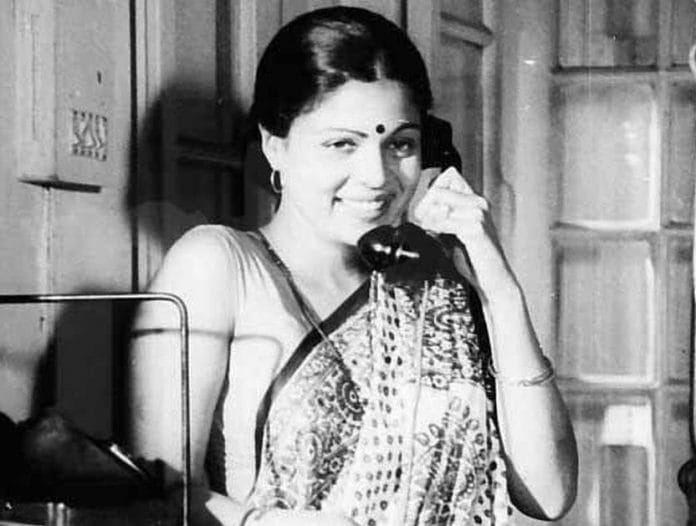From Marathi theatre and cinema to memorable roles in some of Bollywood’s biggest hits, Reema Lagoo was a force to reckon with.
Born Nayan Bhadbhade in Pune in 1958, Lagoo became a household with her role portraying Kokila Kulkarni in the 1990s sitcom Shrimaan Shrimati, and Devaki Verma in the saas-bahu comedy series Tu Tu Main Main, with Supriya Pilgaonkar as the daughter-in-law she loved and sparred with in equal measure.
But her career began long before she was stereotyped as a mother or mother-in-law on screen. As a child, Lagoo was influenced by her mother, Mandakini Bhadbhade, a Marathi stage and film actor. Lagoo went on to appear in several films as a child, including in 1964 film Masterji with the original mother of Hindi and Marathi cinema, Durga Khote.
“It was Durga Khote, the director, who won all my childish attention…She made me feel at home on the sets. I felt I belonged here — despite being a school kid and not a part of the unit,” Lagoo once said.
Also read: Durga Khote, the ‘mother’ of Hindi & Marathi cinema who broke social taboos
She didn’t think Bollywood was for her
She made her way to Mumbai as part of P.L. Deshpande’s successful play Ti Phularani, an adaptation of My Fair Lady, but while she stuck with Marathi theatre, she completed her Masters in Psychology and held down a job in a bank.
When Shashi Kapoor, who saw her in a play at Mumbai’s Prithvi Theatre, offered her a role in his production Kalyug (1981), directed by Shyam Benegal, it was, she recalled, a culture shock.
“I had so many inhibitions! I remember when I was asked to do a bedroom scene with Kulbhushan Kharbanda for the film, I simply broke down! There was nothing that Shyam Benegal could say to stop my tears.”
She then did a few roles here and there, but continued with her bank job for another decade.
Rather early on in her career, Lagoo began to play the role of a mother, beginning with Juhi Chawla’s mother in Qayamat Se Qayamat Tak (1988). But she was so upset with how small her role ended up being, that she once again, turned her back to Hindi movies and went back to Marathi theatre, at the same time doing teleplays and working as a newsreader and a model for advertisements. But in 1989, Maine Pyar Kiya happened, which Lagoo had completed earlier and forgotten about. Little did she know it would become such a smash hit, and would cement her place as one of Hindi cinema’s favourite moms, alongside Nirupa Roy and Farida Jalal.
Lagoo is now an inextricable part of scholarly discourse around the representation of motherhood in Hindi movies, and her repertoire of mother roles is extremely varied and interesting. From being sexually assertive in Rihaee (1988), to being more conventional Qayamat Se Qayamat Tak that very same year, with each role she fleshed out all that it signified be a mother in a patriarchal society.
In 1999’s Vaastav, she gave a memorable and strong performance as a mother of a troubled criminal (Sanjay Dutt), who chooses morals over maternal love by deciding to kill her son. In Mahesh Bhatt’s Aashiqui (1990), she played a single mother, and then again in Karan Johar’s Kal Ho Na Ho (2003), she showed great strength as the single mother of a terminally-ill son played by Shah Rukh Khan.
Instead of letting the typecasting as a mother get to her, she focused on imbuing complexity to every role she played. In 2016, she remarked on the shift in the representation of mothers in cinema and television.
“While the basic emotions of love and tenderness continue, the modern-day mothers are different in the sense that they come across more as a friend to the children. In Hum Aapke Hain Koun..! and Maine Pyar Kiya, I was seen as someone with whom children could share their problems. While in Aashiqui, playing a single working mother, I advise the heroine to pursue her dreams of becoming successful rather than succumb to the demand of marriage. All these mirror the changes in women in the present society. In Naamkarann [a TV show that ran from 2016-17], I operate the laptop and surf the net.”
Also read: Celebrating PL Deshpande — the ‘RK Laxman of prose’
Beyond Bollywood
Lagoo continued to reinvent herself and embraced new roles and opportunities, whether on film or television. In recent past, she appeared in two new TV shows, Star Plus’ Lakhon Mein Ek (2012) and Naamkarann (2016).
“Like several other performers of my generation and above, I am eagerly hoping that the filmmakers will shift their attention to making movies around middle aged and older people that will include elements of romance, pathos, joy and fun. In Hollywood, you have films where seasoned actors like Judi Dench and Meryl Streep play their age and yet are the pivot of the plot,” she said in 2016.
As the industry mourned her sudden death in 2017, many pointed out that Lagoo may be most recognised and remembered for her roles in Bollywood, but her contribution to Marathi cinema and theatre was also noteworthy, with movies such as Janma (2011), in which she played a 50-year-old single mother who will go to great lengths to save her daughter, who has leukemia.
Theatre is perhaps what Lagoo treasured most, though, as she felt that it kept her on her toes as an actor.
“Theatre allows no retakes while providing audience feedback then and there. What I adore about the stage is the element of ‘natya prayog’, which allows you to improvise and improve your performances every time”.






